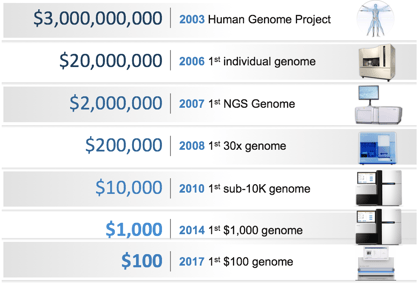Known as National DNA Day, April 25th commemorates the discovery of the double helix structure by James Watson and Francis Crick in 1953 and the completion of the Human Genome Project in 2003. This dual celebration of two monumental milestones offers the opportunity to celebrate the latest advances in genomic research, and reflect on the fevered pace of discovery since the first human genome was sequenced.
 In the decade-and-a-half since the completion of the Human Genome Project, significant advancements in genome sequencing and analysis technologies have greatly reduced the cost of sequencing. Researchers can now sequence more genomes, and therefore create larger datasets to parse through in search of their needle-in-the-haystack discovery.
In the decade-and-a-half since the completion of the Human Genome Project, significant advancements in genome sequencing and analysis technologies have greatly reduced the cost of sequencing. Researchers can now sequence more genomes, and therefore create larger datasets to parse through in search of their needle-in-the-haystack discovery.
Computational innovation has been key to meeting the demands of the mountains of data pouring out of sequencing machines. Beyond creating scalable platforms to manage the growing datasets of genomic information, there is a pressing need for tools that allow researchers to integrate disparate data types — including genotypic and phenotypic data — and collaborate with other researchers within and between organizations.
What seemed to be aspirational in 2008 — to create the largest public database of human variation and genotype data with the 1,000 Genome Project– has been surpassed many fold. The DiscovEHR collaboration between Regeneron Genetics Center and Geisinger Health system, for example, joins together next-generation sequencing (NGS) data from 250,000 exomes with longitudinal electronic health records for the discovery of genetic variation. Two large-scale studies from this collaboration were recently published in the journal Science and discussed the analyses of genetic and phenotypic data from more than 50,000 patients.
Regeneron is also embarking on a joint project with GlaxoSmithKline (GSK) and the UK Biobank, where the genetic variants of 500,000 people will be analyzed. AstraZeneca announced a similar initiative, which will sequence more than 2 million genomes over the next 10 years to inform discovery and development. The vast trove of genomic data that is generated from these research projects empowers scientists and clinicians to study the role that our genome can play in complex diseases.
This genome-based research has help pushed us closer to the promise of precision medicine. Today, the genetic basis of some 5,000 rare disorders is known, enabling researchers to get a deeper understanding of the disease, develop improved diagnostics, and create more targeted and effective therapeutics. Now more than 100 FDA-approved drugs are packaged with genomic information that tells doctors to test their patients for genetic variants linked to efficacy, dose, and adverse side effects.
It is remarkable to see how technological innovation has lead to groundbreaking advances in genomics. Already in the first third of 2017, there have been a number of important discoveries. Take a look at the National Human Genome Research Institute’s (NHGRI) compilation of Notable Accomplishments in Genomic Medicine. At DNAnexus, we are inspired by progress, and are excited to be a part of the genomics revolution.
Join the discussion and participate in NHGRI’s Twitter Chat today at 10am PST (1pm EST). Search the hashtags #DNADayChat or #DNADay17. Special guests Dr. Francis Collins and Dr. Kathleen Rubins will be answering your questions about genomics.

.png)
.png)
.png)